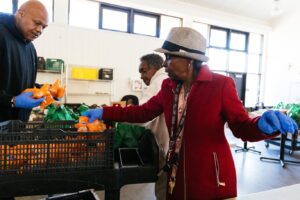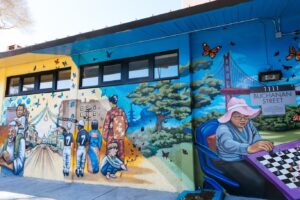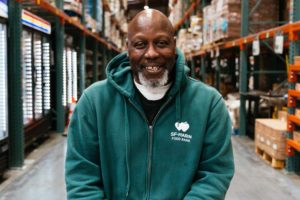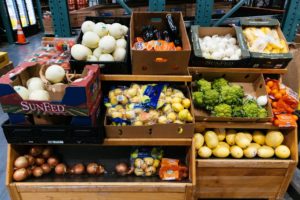On a beautiful, late Wednesday morning, we visited the Rosa Parks Senior Center, where members of The Village Project packed grocery bags to be delivered to community members, primarily senior citizens, in San Francisco’s Fillmore District, also known as the Western Addition.
As we approached several picnic tables assembled into a large rectangle, we could see Adrian Williams, Executive Director of The Village Project among her staff moving quickly through an efficient assembly line to fill green plastic bags with groceries — a typical morning for her. She has been a longtime partner of the San Francisco-Marin Food Bank, where community-based organizations that offer food as part of their other programming can come to purchase food for a few cents a pound.
The Village Project, founded seventeen years ago, began as a program to ensure the youth in the Fillmore/Western Addition communities had access to food and enrichment during the summer, when school was closed, and school lunches weren’t available. It has since evolved to include a yearly summer program for youth, afterschool program, free celebratory events for Kwanzaa and Mardi Gras, grocery deliveries to local families and seniors, and more. It’s all due to Ms. Adrian’s profound passion for youth and her unique ability to identify community needs, and tailor her approach to finding and utilizing resources.
“Ms. Adrian is an amazing part of the community who’s adapted her programming to meet the needs of the neighborhood,” said Food Bank Program Coordinator, Benson Truong. “We are lucky to have partners like her and hope to continue supporting The Village Project in their mission to feed the community.”
We caught up with Ms. Adrian during her break from the assembly line to learn more.

Food Bank: Why did you start The Village Project?
Ms. Adrian: We started in 2006, during the height of violence in this community. I was working in Oakland [and] my grandbaby was growing up [in the Fillmore]. I was taking my grandbaby to school one day on California Avenue and passed by this park — [I saw people] throwing frisbees, dogs were bouncing, people on blankets. Then it dawned on me, I don’t see that in the Western Addition.
[Because I show up for my community by feeding people], I was concerned about how the babies* eat during the summer. I talked with my boss and told him that I wanted to volunteer [in the Fillmore] and feed the babies, and that’s how The Village Project started. [I would] come over on Wednesdays, knock on doors and tell the parents “Let me have your babies,” and I’d take them out on field trips to the Aviation Museum and feed them. For some, it was their first time riding BART.
Eventually, the babies would ask for more. I decided to take a leave of absence from my sales job at a Xerox dealership. My boss held my workstation for two years, [but I got hooked], so I just told him, “I can’t come back.” And that was basically the start of The Village Project.
FB: The Village Project’s website boast the Mardi Gras, San Francisco Style and Seven Days of Kwanzaa events; are there other events that The Village Project hosts?
Ms. Adrian Williams: We also have a community barbeque to kick off the summer. I’m also into the blues, honey, so we have a free blues concert.
My stuff is free, and somebody told me a long time ago that people don’t value free; I tend to disagree. I think it’s just the way you present it. People are prideful, and in the era I grew up in, pride was very important in my community.
FB: What does food mean to you?
Ms. Adrian: I grew up in the South, and we had wonderful lunches. We had real cooks in the kitchen, and we were poor. Growing up, lunch was a major meal for me. So that was one of my concerns, that the babies had food to eat. I guess that’s Southern because I’m always trying to feed people.
FB: Do you want the legacy of your work to continue into future generations?
 Ms. Adrian: My daughter is the president of the Fillmore Corridor, so she’s already walking in my footsteps working with the community.
Ms. Adrian: My daughter is the president of the Fillmore Corridor, so she’s already walking in my footsteps working with the community.
FB: It’s Women’s History Month. What does Women’s History mean for you and your community?
Ms. Adrian: I have a strong history of women [in my family]. I used to always wonder why the male person was often missing in the community, and I figured out why when we got older. In the old days, if you’re subsidizing, you could lose your income if you moved a man into your house. Well, my mother, Ruth Williams, who was the strongest person, worked three jobs, and was always astute. She literally changed legislation in the state of Louisiana to allow women on welfare to have a man stay in their household. It just amazes me how much humanity is deprived because of certain economic situations. That’s how my mother was, strong, extremely strong woman.
* When Ms. Adrian says “babies,” she is talking about young children/youth in general, not just infants and toddlers.


 Step onto the shop floor at the Pennsylvania Warehouse and you’ll be greeted by racks filled with just about every item under the sun: fresh fruits and vegetables (of course), canned beans and proteins, fresh breads and pastries, eggs, frozen proteins like chicken breasts, and assorted dry, fresh, and frozen grocery items from supermarkets all over San Francisco.
Step onto the shop floor at the Pennsylvania Warehouse and you’ll be greeted by racks filled with just about every item under the sun: fresh fruits and vegetables (of course), canned beans and proteins, fresh breads and pastries, eggs, frozen proteins like chicken breasts, and assorted dry, fresh, and frozen grocery items from supermarkets all over San Francisco.  Henry says that lately, “demand is very high, with a limited supply,” because of inflation and supply chain issues, driving home the need for continued support from our community as we strive to keep our shop floor racks full for our neighbors and partners.
Henry says that lately, “demand is very high, with a limited supply,” because of inflation and supply chain issues, driving home the need for continued support from our community as we strive to keep our shop floor racks full for our neighbors and partners. 
Share